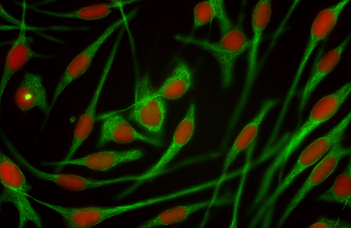
Department of Anatomy, Cell and Developmental Biology
|
head of dept.:
address: room: phone: fax: web page: |
Péter Lőw habil. assoc. prof. 1117 Budapest, Pázmány Péter sétány 1/C., 6.512. (+36-1) 372-2895; (+36-1) 372-2500 /8629 – anatomia.elte.hu |
|
Description of the scientific field
The major task of cell biology is to investigate the functions of animal and human cells by genetic, biochemical and morphological methods. A cell biologist explores how a healthy cell works, seeks what regulates the life processes of cells and how, and investigates what goes wrong in case of diseases. Teaching On the lectures for biology BSc students we present the structure of animal cells, tissues, organs and organ systems, the connection between light and electron microscopic architecture and life habits or regulatory systems. On practicals we exemplify the research methods for investigation of cell functions, we demonstrate the possibilities of imaging technologies with analysis of light and electron micrographs. In additional we provide a unique possibility for students to study the main model animals on their own dissection. The instructors of our department give an insight into nearly all areas of modern cell and developmental biology for enthusiastic MSc students. That way they can familiarize themselves with the molecular genetic and biochemical basics of the cell, they can study the embryonic development of the main model animals, and the most up-to-date developmental research techniques as well. Research Within the subject of molecular cell biology, we investigate the molecular mechanism and regulation of cell death and autophagy (cellular self-digestion). We study the genetic and hormonal regulation of autophagy, the role of autophagy in cell death, in degradation of macromolecules, in neurodegenerative diseases and in tumorigenesis. We use fruit flies (Drosophila) and mammalian cell lines as model organisms for our experiments. The scientific interest of our researcher-instructors covers a wide range of subjects from the regulation of gene expression and RNA interference (RNAi), through autophagy and endocytosis to crinophagy. Here are some current topics:
The departmental research groups receive grants from the Hungarian Academy of Sciences and the National Research, Development and Innovation Office. We publish 15-20 scientific papers annually in the leading peer reviewed journals of cell biology due to active research work. Our department is one of the prestigious research centres of autophagy worldwide. Life at the department The lab meetings and in many cases the lectures are held in English on our department, so students get involved with scientific research in an inspiring international environment. In the weekly Endosome Club new interesting papers are presented by departmental investigators for the colleagues interested in the field. On the Department of Anatomy, Cell and Developmental Biology we primarily educate researchers wanting to solve cell biological problems after getting their PhD degree. Besides academic teaching, such experts are needed in many large research projects in several countries in the world. Research institutions, pharmaceutical companies and private enterprises are also looking for cell biologists. There are further possibilities for those thinking to work in veterinary science, assisted reproduction or stem cell research. How to get involved in cell biology? The best way if the applicant applies for the biology BSc in the Faculty of Natural Sciences on ELTE. For students there are plenty opportunities to study cell biology subjects and to join the research work on the department. Next step is to choose the Molecular Genetics, Cell- and Developmental Biology specialization in our MSc scheme. Here there are even more possibilities to study cell biology and the related developmental biology. Training of cell biology researchers finishes with a 4 years program of Biology Doctoral School. Our department teaches and accepts applicants in the field of molecular cell and neurobiology, who join mainly the research work in the department and they take part also in teaching BSc courses. How to find a student research project? Write an e-mail to that researcher whose research topic you are interested in: Information on public programmes of ELTE Department of Anatomy, Cell and Developmental Biology in the following websites: |

